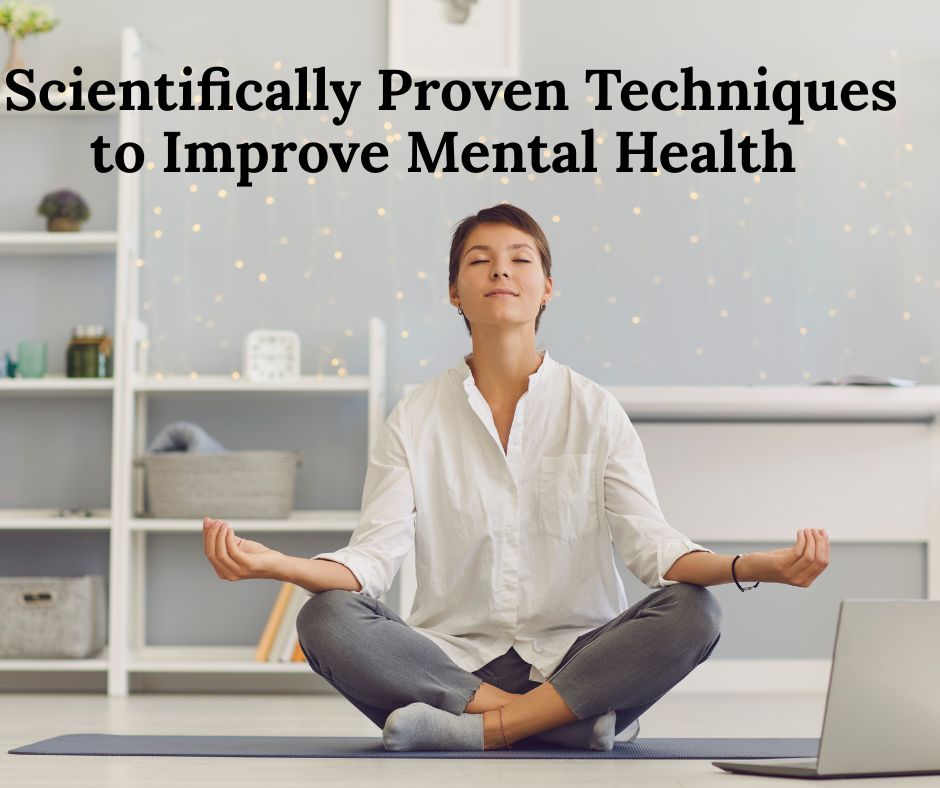5 Scientifically Proven Techniques to Improve Mental Health and Reduce Daily Stress

In our fast-paced world, feeling stressed, anxious, or mentally drained has become a common experience for many. But what if you could take concrete, science-backed steps to reclaim your calm and build lasting mental resilience? The good news is, you can. Improving your mental health isn’t about quick fixes; it’s about incorporating proven strategies into your daily life.
This article explores five powerful, scientifically proven techniques to improve mental health and effectively reduce daily stress. These methods are supported by research in psychology and neuroscience, offering you a practical toolkit for a healthier, happier mind.
1. Practice Mindfulness and Meditation
If you’ve heard about mindfulness but aren’t sure what it entails, you’re not alone. In simple terms, mindfulness is the practice of paying attention to the present moment without judgment. It’s about anchoring yourself in the “here and now” instead of getting lost in worries about the future or regrets about the past.
The Science Behind It:
Studies using fMRI scans show that regular mindfulness meditation can physically change your brain. It increases gray matter density in areas associated with emotional regulation (the prefrontal cortex) and decreases it in the amygdala, the brain’s “alarm system” responsible for fear and stress. This means you become better at managing your reactions to stressful events.
How to Get Started:
-
Begin with 5 minutes: Use an app like Headspace or Calm for a guided session.
-
Focus on your breath: Simply notice the sensation of your breath entering and leaving your body. When your mind wanders (which it will!), gently bring your focus back.
-
Try mindful walking: Pay attention to the feeling of your feet on the ground and the sights and sounds around you.
2. Get Regular Physical Activity
Exercise is not just for physical fitness; it’s one of the most powerful stress reduction techniques available. You don’t need to run a marathon—any form of movement can make a significant difference.
The Science Behind It:
When you exercise, your body releases endorphins, which are natural mood elevators. Physical activity also reduces levels of the body’s stress hormones, such as adrenaline and cortisol. Furthermore, it promotes neuroplasticity—the brain’s ability to form new neural connections—which is crucial for mental well-being.
How to Get Started:
-
Find something you enjoy: This could be dancing, swimming, cycling, or even brisk walking.
-
Aim for consistency over intensity: 30 minutes of moderate activity, 5 times a week, is a great goal.
-
Take it outside: Combining exercise with nature (“green exercise”) has been shown to provide an extra boost for mental health.
3. Prioritize High-Quality Sleep
Sleep is fundamental to mental health improvement. It’s during sleep that your brain processes emotions, consolidates memories, and repairs itself. Skimping on sleep is a direct route to increased irritability, anxiety, and stress.
The Science Behind It:
Research indicates that deep sleep helps recalibrate the brain’s emotional circuits, allowing us to manage the challenges of the next day with greater emotional stability. Chronic sleep deprivation, on the other hand, disrupts the communication between the amygdala and the prefrontal cortex, making us more reactive to stress.
How to Get Started:
-
Establish a routine: Go to bed and wake up at the same time, even on weekends.
-
Create a restful environment: Keep your bedroom dark, cool, and quiet. Avoid screens for at least an hour before bed.
-
Wind down: Develop a pre-sleep ritual, like reading a book or taking a warm bath.
4. Cultivate Social Connections
Humans are social creatures. Strong, positive relationships are a buffer against the negative effects of stress. Feeling connected and supported is a cornerstone of improving emotional health.
The Science Behind It:
Social interaction triggers the release of oxytocin, a hormone that reduces anxiety and promotes feelings of trust and bonding. Studies have consistently found that people with strong social support have better mental health, higher self-esteem, and are more resilient in the face of stress.
How to Get Started:
-
Schedule connection time: Make a conscious effort to call a friend or family member each week.
-
Join a group: Find a club, class, or volunteer organization based on your interests.
-
Be present: When you’re with someone, put your phone away and actively listen.
5. Practice Cognitive Reframing
Our thoughts directly influence our feelings. Cognitive reframing, a core component of Cognitive Behavioral Therapy (CBT), is a technique that helps you identify, challenge, and change stressful thought patterns.
The Science Behind It:
CBT is one of the most extensively researched and scientifically proven forms of psychotherapy. It works by breaking the cycle of negative thinking. By changing your perspective on a stressful situation, you can change your emotional and behavioral response to it.
How to Get Started:
-
Identify negative thoughts: Notice when you’re feeling stressed and ask yourself, “What am I thinking right now?”
-
Challenge the thought: Is this thought realistic? What is the evidence for and against it?
-
Find a balanced perspective: Reframe the thought to be more objective and compassionate. For example, change “I’m going to fail this presentation” to “I am well-prepared, and I will do my best.”
Conclusion: Your Mental Health Journey Starts with One Step
Improving your mental health is a journey, not a destination. You don’t need to implement all five of these techniques to reduce stress at once. Start with one that resonates with you, practice it consistently, and notice the positive shifts in your daily life. By investing in these science-backed strategies for mental wellness, you are building a stronger, more resilient mind capable of handling life’s inevitable stresses with greater ease. Your well-being is worth the effort.




